I remember wanting to be an action star. I also remember how sad I was when I realized that it’s not practical to be an action star in real life. But the myth of the action star did affect me as a person deeply. Because of the action star, my idea of masculinity has been distorted, as I often associate being a man with not crying, beating up bad guys, and growing sideburns.
Also, I was not very popular in high school (or ever) because I liked leather and denim jackets, even when the weather was warm. But this article is not about my personal issues. It’s about being psychologically messed-up by the greatest B-movie archetype in the world – the Action Star!
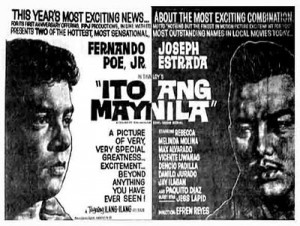
My dad is a big fan of Mr. Action Star himself, Fernando Poe Jr. In fact, he had VHS copies of most, if not all of his films. When he first established a video shop when I was a kid, I think he bought all the FPJ films and we watched one every night. One Christmas, inspired by all the action awesome, my dad bought every one of my brothers a pellet gun so we could all practice together, and he also taught us how to do a Chinese get-up (I don’t know what it had to do with FPJ. I’ve never seen FPJ do a Chinese get-up).
To us, FPJ was a mythical figure, a divine savior; he’s the hero who comes and provides salvation to a community at the brink of despair – because they believed in him. FPJ was like a cool Catholic Jesus.
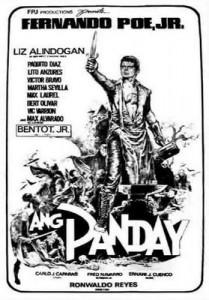
I’m making this comparison because I think the action star has ties with the Catholic mythos. This myth of “the chosen one” has been a very popular concept in Catholicism (Jesus) and I think that that this “chosen one/savior” mythos is partly to be blamed for the Philippine’s political culture. In other words, I’m saying that we have some terrible government officials because we believe in action stars (among other things, of course).
Catholic faith is among the things many Filipinos are proud of. The fact that the Philippines is the only country left in the world without divorce is kind of primitive, but for some reason it is considered by many Filipinos as something to be proud of. In fact, the term devoutly Catholic is an adjective many Filipinos pretend to identify with.
The “chosen one/savior” myth inspired by Jesus fiction is permanently installed in the Filipino collective unconscious. This myth is often manifested in local fantasy movies and television shows like “Captain Barbell,” “Sugo,” “Mulawin,” and “Panday.” Such shows have one thing in common: a savior comes and saves the day.
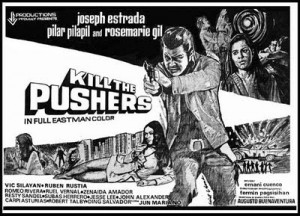
The popularity and constant resurrection of the savior archetype is a manifestation of the Filipino’s Catholic desire to be saved. Unfortunately, what often comes with the desire to be saved is an attitude of fatalism – an acceptance of helplessness and powerlessness. An eagerness for “the next life.” Instead of fighting to gain control of their own situations, these people pray for a hero. If the hero doesn’t happen to come, it’s okay because everyone’s going to heaven, especially the poor, because according to the local priest, the poorer you are on Earth, the bigger your castle is in heaven.
The savior’s modern equivalent, of course, is the action star. If you’ve ever seen a single Filipino action movie, you’ve probably noticed a few things:
1) The hero never dies.
2) The hero never runs out of bullets.
3) The hero can kill an entire army all by himself.
4) The hero always saves the day.
5) The hero only gets hit on the shoulder.
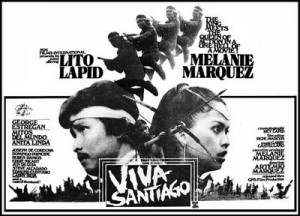
Such reinforcement in media constructs the archetype of a savior who doesn’t need anyone’s help, who can save the world by himself. Again, this culture of hero-worship is not unique to the Filipino. The Westerners have their Chuck Norrises and Tim Tebows.
The Philippine context, however, is unique in that it seems as if the average Filipino has no capacity to distinguish between fantasy and reality:
1. Antagonists of popular telenovelas suffer much verbal abuse (in real life) from fans of the show they star in.
2. Fans of love teams such as “Kimerald” (Kim Chiu + Gerald Anderson) rage when they realize that these kids are no longer dating in real life.
3. Many of our action stars are voted into important government positions.
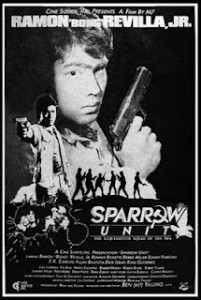
I think one of the reasons why action stars are voted into these positions is because they symbolize the solo-savior-Jesus archetype ingrained in the subconscious of many Filipinos. When voters fall in line to vote, what they recall are the roles these people play and the superhuman deeds these actors achieved in the movies.
The shows Filipinos have made to entertain themselves, unfortunately, have convinced majority of their population that a savior would come to save them from poverty.
Even worse is that Filipinos assume that this savior – whoever he is, whatever his qualifications are – can save the country all by himself, without their help, because that is how saviors are; they single-handedly save communities. What we might have, in the end, is a voting population who votes for their favorite superheroes and expects their heroes to save them, without their help.
As long as the messiah myth persists, people will continue to wait for one, and vote for one. They will continue to wait and expect to be saved, rather than work to save themselves. In order for people to start saving themselves, they must realize that the savior, whether his name is Jesus or whatever, is a myth and that he’s not coming.

